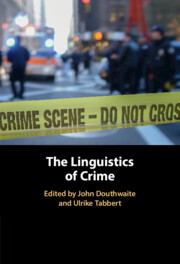Book contents
- The Linguistics of Crime
- The Linguistics of Crime
- Copyright page
- Contents
- Figures
- Tables
- Contributors
- 1 Editorial Introduction
- 2 The Metaphoric and Metonymic Conceptualisation of the Other
- 3 Prison Metaphors
- 4 Ideology in Mainstream Crime Fiction
- 5 A Critical and Stylistic Analysis of the Depiction of the Transnational Human Trafficking Victim in Minette Walters’ The Cellar
- 6 The Linguistic Construction of Political Crimes in Kurdish-Iraqi Sherko Bekas’ Poem The Small Mirrors
- 7 Stylistic Aspects of Detective Fiction in Translation
- 8 Transnational Adaptations of Sherlock Holmes
- 9 The Ethical Effects of Voice-Over Narration on a Victim Testimonial
- 10 Realising Betrayal
- 11 ‘Nossa Vida é Bandida’
- 12 Deviant Mind Style of a Schizophrenic Offender
- 13 Narrower or Broader Ground? The Role and Function of Metaphors in Legal Discourse
- 14 Condemning the Condemners
- 15 Ideology in Critical Crime Fiction
- Index
- References
14 - Condemning the Condemners
The Portrayal of Regulators in UK News about Corporate Crime
Published online by Cambridge University Press: 05 January 2023
- The Linguistics of Crime
- The Linguistics of Crime
- Copyright page
- Contents
- Figures
- Tables
- Contributors
- 1 Editorial Introduction
- 2 The Metaphoric and Metonymic Conceptualisation of the Other
- 3 Prison Metaphors
- 4 Ideology in Mainstream Crime Fiction
- 5 A Critical and Stylistic Analysis of the Depiction of the Transnational Human Trafficking Victim in Minette Walters’ The Cellar
- 6 The Linguistic Construction of Political Crimes in Kurdish-Iraqi Sherko Bekas’ Poem The Small Mirrors
- 7 Stylistic Aspects of Detective Fiction in Translation
- 8 Transnational Adaptations of Sherlock Holmes
- 9 The Ethical Effects of Voice-Over Narration on a Victim Testimonial
- 10 Realising Betrayal
- 11 ‘Nossa Vida é Bandida’
- 12 Deviant Mind Style of a Schizophrenic Offender
- 13 Narrower or Broader Ground? The Role and Function of Metaphors in Legal Discourse
- 14 Condemning the Condemners
- 15 Ideology in Critical Crime Fiction
- Index
- References
Summary
Ras looks at how British and American tax authorities (FSA, SEC) are portrayed in newspaper reports on corporate tax fraud. She combines CDA with corpus linguistics and analyses naming choices and transitivity as well as conceptual metaphors in a large dataset (corpus). Her objective is to demonstrate how power is wielded (in this case by large corporations) to influence the workings of the legal system.
- Type
- Chapter
- Information
- The Linguistics of Crime , pp. 301 - 329Publisher: Cambridge University PressPrint publication year: 2023

